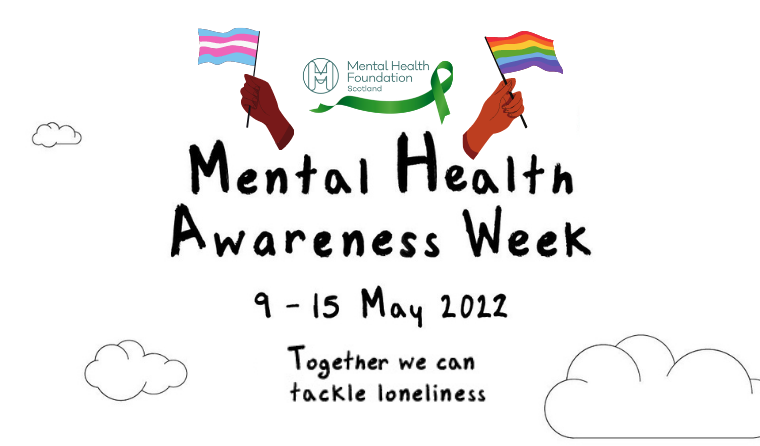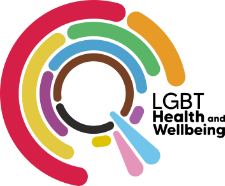Mental Health Awareness Week: loneliness in the LGBT+ community
It’s Mental Health Awareness Week and this year the UK national campaign looks at loneliness. The Mental Health Foundation research highlights that LGBT+ people are at greater risk of experiencing loneliness, something we know all too well as an organisation working with the LGBT+ community in Scotland.
Some of the reasons for this are that LGBT+ people are more likely to be single, childless, living alone, in less frequent contact with their family of origin, and at greater risk of social isolation – this risk is particularly acute for vulnerable sections of the community such as older LGBT+ people and LGBT+ asylum seekers and refugees.
Another reason for this is minority stress which is the negative impact of living with a stigmatised identity. Despite progress in LGBT+ rights in Scotland and across the world, stigma and disapproval of LGBT+ identities remain prevalent, contributing to the marginalisation and discrimination of our community. As a result, many LGBT+ people live with shame and fear leading to social anxiety which is a risk factor for loneliness. The pandemic also highlighted how isolated some LGBT+ people were with little to no support networks to turn to.
At LGBT Health and Wellbeing, we work to reduce loneliness and social isolation within the LGBT+ community in Scotland by providing safer and affirmative social spaces for LGBT+ people to come together and connect. We also do this by encouraging the involvement of LGBT+ people in shaping our services and supporting their delivery. We support individuals to participate as community members, volunteers, peer group leaders and human rights activists in our organisation.
At the end of 2021, 85% of people who use our services told us that they feel less lonely as a result of joining our social community programmes, and 88% feel more connected to their community. They told us that what they value the most is making new connections, feeling like they belong, feeling part of a community and not feeling alone anymore:
“I find events like this so valuable, as someone who is not yet fully out – it makes me feel more connected to others and less alone.”
It has provided me with comfort and support following a period of very low mood. It has helped to combat the loneliness that comes with poor mental health”
 Tracy’s story
Tracy’s story
Tracy (she/her) is a 56-year-old disabled intersex trans woman with complex health needs and reduced mobility since an accident, meaning she isn’t able to leave the house as much as she used to. Tracy began engaging with LGBT Health and Wellbeing by attending Coffee Posse, our café meetup space for LGBT people aged 50 and over in both Edinburgh and Glasgow. Through Coffee Posse Tracy had the opportunity to spend time with fellow queer people socially in a way that suited her access needs as a wheelchair user.
“At LGBT Health and Wellbeing, there is a sense of belonging. I have made some wonderful friends from the organisation both online and in person. You don’t feel alone all of a sudden. Instead of seeing a disabled trans woman, they see me. They give you a sense of belonging.”
Tracy also engages with our Trans Social Lounge where she attends monthly film nights. After a Christmas social event, Tracy recognised some trans people wanted a more regular informal space to hang out online, and so she introduced the trans Friday Night Social Chat, a weekly Zoom hangout providing trans people with the opportunity to be themselves and socialise in an unstructured and organic way.
 Thierry’s story
Thierry’s story
Thierry (he/him) is a 31-year-old gay man originally from Cameroon. He first came to LGBT Health and Wellbeing when he arrived in Glasgow in 2019. Being new to Glasgow, and having a limited support and social network, he wanted to make connections and learn more about the diversity of the LGBT community and its culture.
“Engaging with LGBT Health helps to equip you to become part of your local community, as well as the LGBT community in Scotland”.
Thierry first attended one of our social events, where he felt instantly welcomed and affirmed in his identity. Having very little knowledge or understanding of LGBT issues, Thierry took the opportunity to attend events and use the educational resources provided by the organisation to learn more about the community. Whilst learning, Thierry also made many friends, including through our LGBT Refugee Project.
“It was very good to feel like, okay there are people like me here! I could connect with them and get involved and contribute. It was rewarding; mentally, physically, emotionally. It was everything that you could possibly imagine.”
After some time, Thierry began to volunteer with LGBT Health and Wellbeing as he was keen to give back to the community and help to create a welcoming environment for LGBT asylum seekers like him. After two years of volunteering, Thierry applied for a role with LGBT Health and Wellbeing as a sessional worker on the Refugee Project which he successfully got. Thierry is extremely proud of himself and his journey with the organisation.
Combat loneliness with LGBT Health and Wellbeing
If you know someone LGBT+ who is socially isolated, let them know that LGBT Health and Wellbeing is there for them.
We have a social programme of regular meetups, community discussions and groups, for LGBT+ people in Scotland to come together and build connections.
We run the national LGBT Helpline Scotland which offers emotional support and signposting information to all LGBT+ people across Scotland. Open Tuesdays & Wednesdays (12-9pm) and Thursdays & Sundays (1-6pm). Phone (0300 123 2523), email (helpline@lgbthealth.org.uk) and live chat (www.lgbthealth.org.uk) support.
We run Telefriending which is a phone-based service making regular calls to older LGBT+ people aged 50 and over across Scotland, who are isolated.
We offer a programme of mental health support which includes counselling, individual support sessions (phone, email, online) and a social programme of regular groups and workshops aimed at supporting LGBT+ people to look after their mental health and wellbeing.
We also provide specialist support for trans people, older LGBT+ people and LGBT+ asylum seekers and refugees.
Resources
The Mental Health Foundation has a resource hub with help and advice on how to cope with loneliness.
The Scottish Mental Health and Arts Festival invites us to ‘Gather’ from 4th-24th May with over 200 events taking place across Scotland and online.
Key references
“Marginalization and Loneliness Among Sexual Minorities: How Are They Linked” (Campaign to End Loneliness, February 2022)
“All The Lonely People” (Mental Health Foundation, May 2022)
“Combatting Loneliness Amongst Older LGBT People” (Age UK, February 2018)
“Queer Asylum Seekers Left Facing Isolation, Hunger and Mockery – Right Here in the UK” (Pink News, May 2021)

